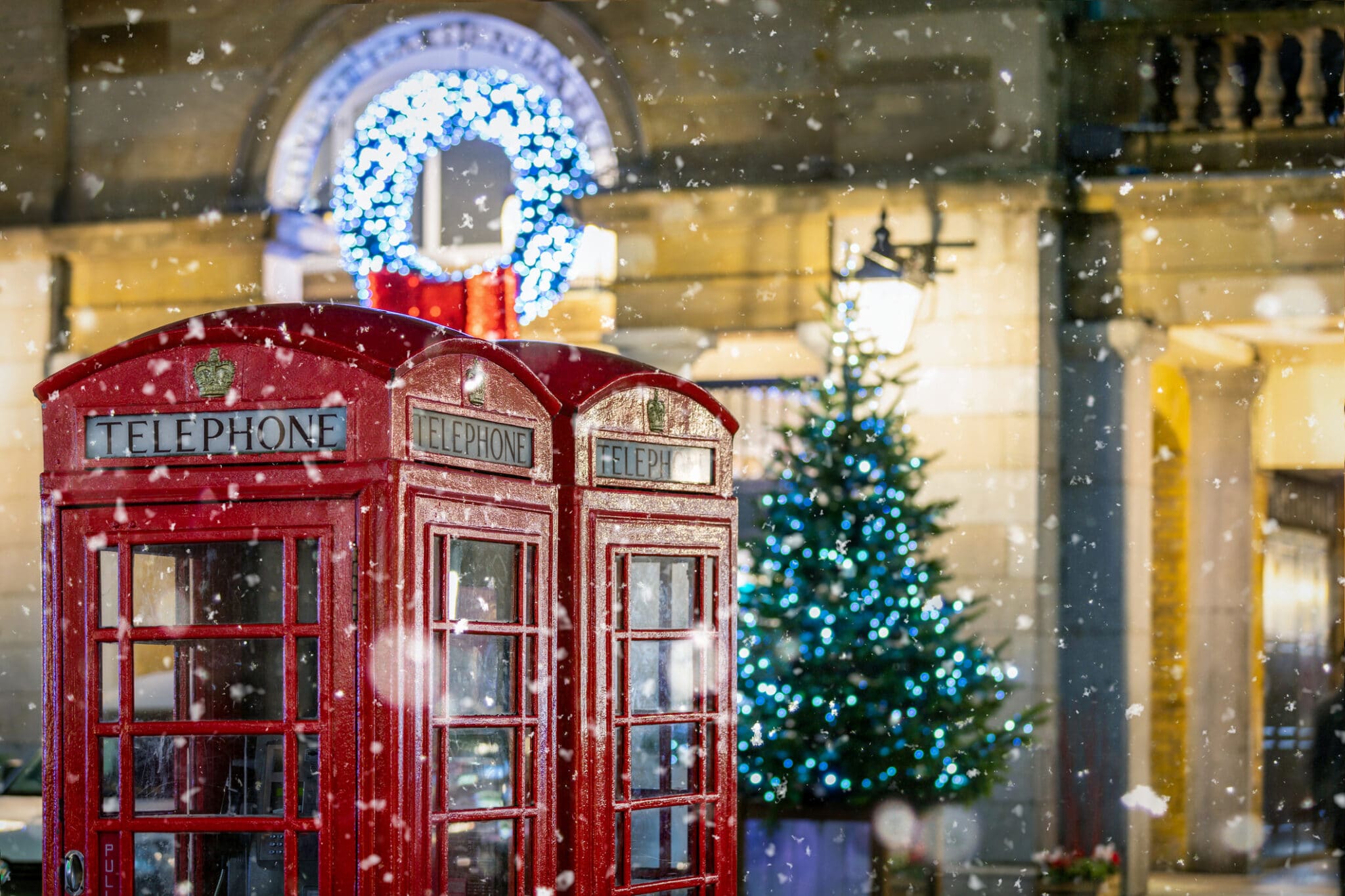The Holly and the Ivy

One of the early Christmas traditions begun by Christians in Britain was the decorating of the home with evergreens. While the Christmas tree would not find its way from Germany to Britain until 1840, holly, ivy, bay, and rosemary were all used as symbols of everlasting life. What’s more, rosemary stood as a symbol of remembrance and bay of valour. Holly, with its masculine symbolism and ivy as its feminine counterpart were also meant to represent the stability of a home.
White Christmas Origin
In 2014, it was reported that it’s only snowed in Britain on Christmas 4 times in the last 52 years. The image of a white Christmas is thought to have originated with the writings of Charles Dickens. During his lifetime, he grew up in a “Little Ice Age” and it snowed each Christmas for the first eight years of his life, supposedly influencing him to include it in his imagery for A Christmas Carol and other works.
Christmas No. 1s
The tradition of the Christmas no. 1 single began in 1973 when Slade’s “Merry Xmas Everybody” hit the top of the charts on Christmas Day (though other Christmas songs had made it to the top spot before this). As Christmas is a major time for buying albums (along with many other items), it became part of British culture for bands to contribute songs especially for the holiday season. Since 2002, these have largely been singles by singers affiliated with the programme X-Factor. This trend was beaten in 2009 by a successful radio and Facebook campaign to get Rage Against the Machine’s 1992 single “Killing in the Name” as the no. 1 (specifically for its line “F*** you! I won’t do what you tell me!”). The highest selling Christmas single was Band Aid’s 1984 hit “Do They Know It’s Christmas?” at 3.5 million copies. The second highest is Wham!’s “Last Christmas” in the same year with 1.4 million. The Beatles have the record for the most no. 1 singles on Christmas Day at 4 with “I Want to Hold Your Hand” in 1963, “I Feel Fine” in 1964, “Day Tripper/We Can Work It Out” in 1965, and “Hello, Goodbye” in 1967.
Father Christmas Lives in Scotland
Letters to Father Christmas that give his address as “Toyland” or “Snowland” will typically go to Edinburgh. Ones addressed to the North Pole will go to the post office of Santa Claus Holiday Village on the outskirts of Rovaniemi in the Arctic Circle of Finland.
Christmas Present from Norway

Oslo has sent London a Christmas tree every year since 1947 as a thank you for Britain’s contributions to the fighting in World War II. The tree is placed in Trafalgar Square.
Welsh
In the Welsh language, Christmas is called “Nadolig Llawen.”
Christmas Savings
Britons usually spend nearly £22 billion during the holiday season, special Christmas discounts and coupons will save consumers £51 million. Shoppers also spend £700 million on unwanted Christmas gifts, like the horrible jumper your aunt gave you.
What’s in the Box?

Boxing Day’s name originates from the “Christmas box” that servants and staff would receive from their employers on the day after Christmas.
Hogmanay
Celebrated in Scotland the same way that New Year’s Eve is celebrated in England and the rest of the world, Hogmanay was once more popular than Christmas. Christmas wasn’t treated in the festival sense that it is today and Hogmanay was the time for friends and family to get together to celebrate the solstice and exchange gifts. Christmas was a normal working day in Scotland up until 1958.
First Christmas
The very first Christmas holiday celebrated in England is believed to have taken place in York in 521 A.D., by none other than the mythical King Arthur, whose forces marred the celebrations with their retaking of the city.
source: anglotopia
What can you connect to the following words? Can you fill in the table?
bay | |
holly | |
ivy | |
snow | |
The Beatles | |
Toyland | |
Trafalgar Square | |
jumper | |
Boxing Day | |
solstice | |
King Arthur |
Key:
bay | Christians, decorating the houses with evergreen, everlasting life, symbol of valour |
holly | Christians, decorating the houses with evergreen, everlasting life, masculine symbolism, stability of the household |
ivy | Christians, decorating the houses with evergreen, everlasting life, feminine symbolism, stability of the household |
snow | White Christmas, Charles Dickens, A Christmas Carol, „Little Ice Age”/a lot of snow |
The Beatles | the most No. 1 singles on Christmas Day, “I Want to Hold Your Hand” in 1963, “I Feel Fine” in 1964, “Day Tripper/We Can Work It Out” in 1965, and “Hello, Goodbye” in 1967 |
Toyland | Edinburgh, Scotland, Father Christmas |
Trafalgar Square | Norway, Oslo, present, 1947, Britain’s contribution to World War II |
jumper | horrible, unwanted present your aunt gave you |
Boxing Day | originates from the “Christmas box” that servants and staff received from their employers on the day after Christmas |
solstice | Scotland, Hogmanay, the time for friends and family to get together to celebrate and exchange gifts. |
King Arthur | York, 521 A.D., first Christmas, retaking of the city, marring the celebration |
Vocabulary
| holly | magyal |
| ivy | borostyán, repkény |
| Christian | keresztény |
| evergreen | örökzöld |
| bay | babér |
| rosemary | rozmaring |
| everlasting life | örök élet |
| remembrance | emlékezés, emlékezet |
| valour | bátorság, hősiesség |
| masculine | férfias |
| feminine | nőies |
| counterpart | párja |
| to represent | kifejezni |
| stability | stabilitás, állandóság |
| to originate | eredni |
| supposedly | feltehetőleg |
| to influence | befolyásolni |
| to include | beletenni, belefoglalni |
| imagery | ábrázolás |
| charts | slágerlista |
| major time | fő időszak |
| to contribute | adni, hozzájárulni |
| affiliated | kapcsolatban van, kapcsolható valamihez |
| North Pole | Északi-sark |
| outskirts | külső kerületek |
| contribution | hozzájárulás |
| billion | milliárd |
| discount | leértékelés, árengedmény |
| unwanted | nem kívánt |
| jumper | pulóver |
| Boxing Day | karácsony másnapja |
| to originate | eredni |
| servant | szolga |
| staff | személyzet |
| to treat | kezelni |
| to get together | összejönni |
| solstice | napforduló |
| forces | csapatai |
| to mar | elrontani, belerondítani valamibe |
| to retake | visszafoglalni |






